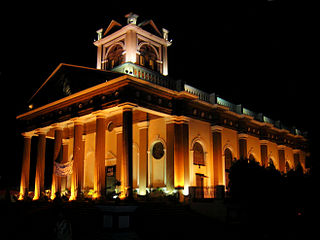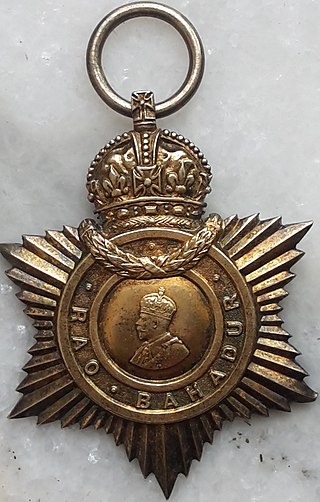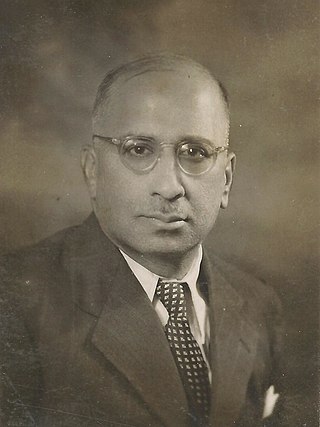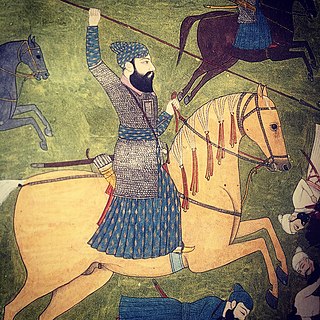Related Research Articles

Chaudhary Devi Lal was an Indian statesman and politician who served as 6th Deputy Prime Minister of India from 1989 to 1990 and from 1990 to 1991. Lal emerged as farmer leader from the state of Haryana, and served as the Chief Minister of Haryana from 1977 to 1979 and then from 1987 to 1989. He was the founder of Indian National Lok Dal. He was popularly known as Tau, meaning uncle.

Kapurthala is a city in Punjab state of India. It is the administrative headquarters of Kapurthala District. It was the capital of the Kapurthala State, a princely state in British India. The aesthetic mix of the city with its prominent buildings based on French and Indo-Saracenic architecture self-narrate its princely past. It is also known as city of Palaces & Gardens. According to the 2011 census, Kapurthala is the least populated city in India.

Hisar district is one of the 22 districts of Haryana, India. Hisar city serves as the district headquarters. Hisar district has four sub-divisions that is, Hisar, Barwala, Hansi and Narnaud, each headed by an SDM. The district is also part of Hisar division. Hisar was founded by Firuz Shah Tughlaq.

Gurdaspur district is a district in the Majha region of the state of Punjab, India. Gurdaspur is the district headquarters. It internationally borders Narowal District of Pakistani Punjab, and the districts of Amritsar, Pathankot, Kapurthala and Hoshiarpur. Two main rivers Beas and Ravi passes through the district. The Mughal emperor Akbar is said to have been enthroned in a garden near Kalanaur, a historically important town in the district. The district is at the foothills of the Himalayas.

Batala is the eighth largest city in the state of Punjab, India in terms of population after Ludhiana, Amritsar, Jalandhar, Patiala, Bathinda, Mohali and Hoshiarpur. Batala ranks as the second-oldest city after Bathinda. It is a municipal corporation in Gurdaspur district in the Majha region of the state of Punjab. It is located about 32 km from Gurdaspur, the headquarters of the district. It is also a Police district. Batala holds the status of the most populated town of the district with 31% of the district's total population. It is the biggest industrial town in the district.

Shaheed Bhagat Singh Nagar district is one of twenty-three districts of state of Punjab, India. It is located in Doaba region. It consists of three subdivisions, Nawanshahr, Banga, and Balachaur. There are three legislative seats in the district, Nawanshahr, Balachaur and Banga. They fall under the Anandpur Sahib Lok Sabha Constituency. Nawanshahr, the district headquarters is about 92 kilometres (57 mi) from Chandigarh, the state's capital.

Majha is a region located in the central parts of the historical Punjab region split between India and Pakistan. It extends north from the right banks of the river Beas, and reaches as far north as the river Jhelum. People of the Majha region are given the demonym "Mājhī" or "Majhail". Most inhabitants of the region speak the Majhi dialect, which is the basis of the standard register of the Punjabi language. The most populous city in the area is Lahore on the Pakistani side, and Amritsar on the Indian side of the border.

Rao Bahadur and Rai Bahadur, abbreviatedR.B., was a title of honour bestowed during British rule in India to individuals for outstanding service or acts of public welfare to the Empire. From 1911, the title was accompanied by a medal called a Title Badge. Translated, Rao means "King", and Bahadur means "Brave". Bestowed mainly on Hindus, the equivalent title for Muslim and Parsi subjects was Khan Bahadur. For Sikhs it was Sardar Bahadur.
Fatehgarh Churian is a town located in Gurdaspur district in Punjab, India. It is nearby Gurdaspur city, the district headquarter. It is a municipal council of the Gurdaspur district. The city lies 15 kilometres from the Pakistani border. It is located 485 kilometres north of New Delhi, India.

The Imperial Legislative Council (ILC) was the legislature of British India from 1861 to 1947. It was established under the Charter Act of 1853 by providing for the addition of 6 additional members to the Governor General Council for legislative purposes. Thus, the act separated the legislative and executive functions of the council and it was this body within the Governor General's Council which came to known as the Indian/Central Legislative Council. In 1861 it was renamed as Imperial Legislative Council and the strength was increased.

Mehr Chand Mahajan was the third chief justice of the Supreme Court of India. Prior to that he was the prime minister of the state of Jammu and Kashmir during the reign of Maharaja Hari Singh and played a key role in the accession of the state to India. He was the Indian National Congress nominee on the Radcliffe Commission that defined the boundaries of India and Pakistan.
Harnam Singh Saini was a notable Indian revolutionary who participated in Ghadar Conspiracy and was hanged by British colonial government on 16 March 1917 in Lahore for instigating revolt against the empire. He was tried under third Lahore Conspiracy Case trial.

The Council of State was the upper house of the legislature for British India created by the Government of India Act 1919 from the old Imperial Legislative Council, implementing the Montagu–Chelmsford Reforms. The Central Legislative Assembly was the lower house.
Sadhu Ram Chaudhari, OBE, IGP was the first police chief of the state of Himachal Pradesh and union territories of Delhi and Ajmer in independent India.

General elections were held in British India between 28 October and late November 1926 to elect members of the Imperial Legislative Council and the Provincial Legislative Councils.

Rai Sahib Karam Chand Jain was the first Legal Advisor of the War & Supply Department of India and Special Police Establishment (SPE), which later developed into the Central Bureau of Investigation (CBI). He was also the Public Prosecutor of the Undivided Punjab and a distinguished criminal lawyer in his later years of private practice.

Banda Singh Bahadur, was a Sikh warrior and a commander of the Khalsa army. At age 15, he left home to become an ascetic, and was given the name Madho Das Bairagi. He established a monastery at Nānded, on the bank of the river Godāvarī. In 1707, Guru Gobind Singh accepted an invitation to meet Bahadur Shah I in southern India, he visited Banda Singh Bahadur in 1708. Banda became disciple of Guru Gobind Singh and was given a new name, Gurbaksh Singh(as written in Mahan Kosh), after the baptism ceremony. He is popularly known as Banda Singh Bahadur. He was given five arrows by the Guru as a blessing for the battles ahead. He came to Khanda, Sonipat and assembled a fighting force and led the struggle against the Mughal Empire.
Chaudhary Chand Ram (1923–2015) was an Indian politician and first Deputy Chief Minister of Haryana.
References
- 1 2 "Saini, RB, DC, MBE, 2 June 1943." The India Office and Burma Office list for ..., Volume 56, pp 106, Great Britain. India Office, 1947
- 1 2 3 " Chaudhri Dewan Chand Saini was another lawyer practicing on the criminal side those days. Later on he became Rai Sahib and leader of the Criminal Bar, but unfortunately died of cancer at a comparatively young age." Looking Back: The Autobiography of Mehr Chand Mahajan, Former Chief Justice of India, pp 45,Mehr Chand Mahajan, Published by Asia Pub. House, 1963
- 1 2 The Punjab Legislative Council Debates. Official Report,pp 1028 & 1047, Published By Legislative Council, Punjab (India), 1936
- ↑ Mahatma Hansraj: Maker of the Modern Punjab, pp 132, Sri Ram Sharma, Published by Arya Pradeshik Pratinidhi Sabha, 1941
- ↑ The Punjab and the war , pp 185, Maxwell Studdy Leigh, Lahore, Printed by the Superintendent, Government Printing, Punjab, 1922
- 1 2 "Chaudhri Parkash Chand Saini, son of Rai Bahadur Diwan Chand, Civil Lines, Gurdaspur," pp 503, Punjab (India). Legislature. Legislative Assembly – 1964